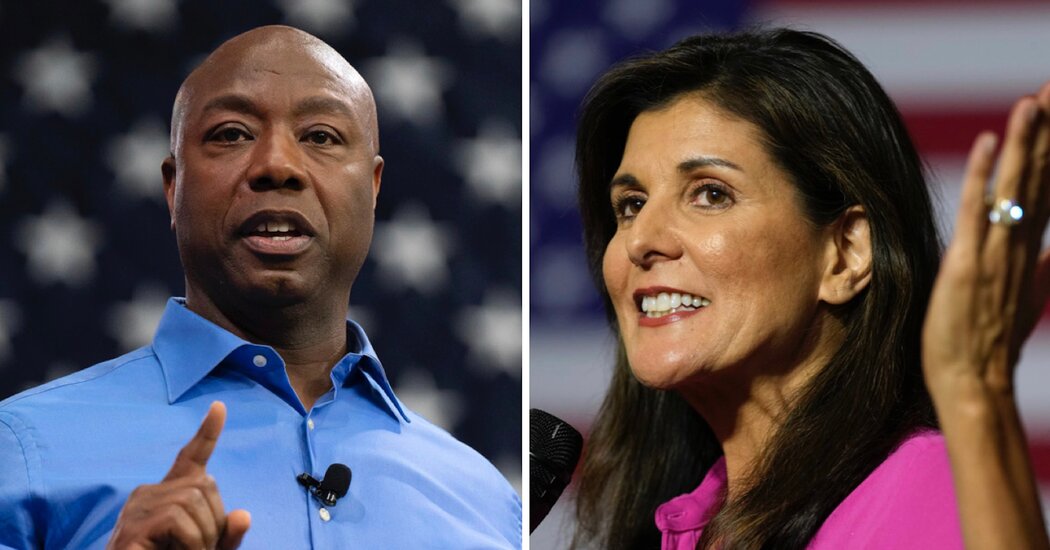United States
Talk Of Racism Proves Thorny For GOP Candidates Of Color

Talk Of Racism Proves Thorny For GOP Candidates Of Color: Senator Tim Scott of South Carolina began his presidential campaign with a touching account of his family’s battle with the nation’s racial heritage. Scott’s story of his grandfather’s third-grade expulsion to harvest cotton in the Jim Crow South is a striking reminder of GOP candidates of color’s difficult path to national prominence.
In parallel, Republican candidate Nikki Haley recounts her childhood as an immigrant kid in a tiny South Carolina town, including the loneliness and hardships of being the only Indian family. While speaking to all-white audiences, conservative pundit and presidential candidate Larry Elder recalls his father’s tribulations as a Pullman porter in the segregated South, carrying meals in dread of starvation.
These anecdotes highlight their astonishing rise to the top of American politics, but they also produce a confusing racial debate. Their prejudiced experiences are highlighted. Despite their near-identical experiences, they tend to deny systematic racism in the nation.
Scott’s Iowa campaign commercial says, “I’m living proof that America is the land of opportunity and not a land of oppression,” despite his seven police stops in a year for driving a new automobile.
This contradiction in American racial views has become a significant subject in the 2024 election, sparking a cultural debate about “wokeness” and racial inequality.
A Subset Of The Structural Racism Argument Involves Interpreting Politicians’ Narratives To Identify Themselves And Their Programs.
Tim Scott’s belief in America as the land of opportunity despite racial profiling and discrimination shows the Republican Party’s racial complexity. While conservatives like former President Donald J. Trump and Florida Governor Ron DeSantis are emphasizing racial grievances, candidates like Scott and Haley continue to downplay systemic racism in America, sparking political critique and introspection.
However, placing these tales against a more divided political scene highlights the many complexities of race and identity in the US today, influencing the 2024 presidential election.
Political Narrative Racial Biographies
With Senator Tim Scott, Nikki Haley, and Larry Elder sharing personal racial tales, GOP race discussions have grown. Scott’s vivid memory of his grandfather’s struggles in the Jim Crow South, Haley’s account of being the only Indian family in her small South Carolina town, and Elder’s account of his father’s trials in the segregated South demonstrate the Republican party’s complex racial narratives.
Talk Of Racism: Different Views On Structural Racism
The argument about “wokeness.” and institutional racism in America remain fundamental to the political scene. Some Republican candidates of color share personal experiences that reveal systematic racism, but their larger narrative generally denies it. This juxtaposition sparked a complex conversation about political and racial rhetoric.
Republican Racial Identity Negotiation
Republican candidates of color must balance appealing to a primarily white audience with addressing the complicated reality of racial relations in America. They typically minimize systematic racism to coincide with Republican rhetoric, which tries to reject critical race theory and promote a non-racist America. This GOP strategy to navigate racial identification illuminates race and political messaging in modern American politics.
Read Also: Author Refuses To Remove References To Racism After Publisher’s Request
Gop Audience Racial Perception Dynamics
Republican candidates of color must address racial problems while appealing to white voters. These politicians stress personal tales of effort and accomplishment to appeal to their audience as living models of the American dream. This narrative downplays structural difficulties that people of color face. By emphasizing individual actions, these politicians want to ease the uneasiness of their primarily white Republican voters and promote party unity and success.
This technique has been criticized by political observers and academicians who say it ignores racial discrimination and structural inequalities. These personal anecdotes show the candidates’ endurance, but they often minimize minority groups’ struggles with unfair police, economic inequality, and racial profiling. Candidates’ campaigns have to combine appealing to GOP voters and confronting systematic racism.
The Impact Of Policy On Race Discussion
GOP candidates of color influence party race discourse via their political and policy views. Some candidates stress personal responsibility and minimal government interference, while others encourage inclusion and structural equity. This duality commonly divides affirmative action, criminal justice reform, and educational equity.
Some candidates say merit-based systems are better than affirmative action programs, while others realize the historical backdrop that requires such policies to address long-standing imbalances. Criminal justice reform and mass incarceration’s effects on communities of color show the challenges of handling systemic concerns. These policy talks require candidates to balance party principles with racial equality and social justice.
Political Narratives And Racial Authenticity
How GOP candidates of color tell their stories depends on racial authenticity. Many of these candidates engage with broad audiences and illustrate America’s racial progress by addressing personal and racial prejudice and stressing their accomplishments and resiliency. By sharing their tales, these politicians want to connect to people across the political spectrum by showing their resilience.
Many critics wonder whether these narratives accurately depict disadvantaged populations’ underlying issues. This examination emphasizes the need for sophisticated race and identity discourse in politics. Authenticity is crucial to public image and trust. Therefore, candidates must carefully negotiate their ethnic identities and societal narratives. As the political environment changes, racial authenticity’s impact on public opinion and political messaging remains crucial to GOP race discourse.













You must be logged in to post a comment Login